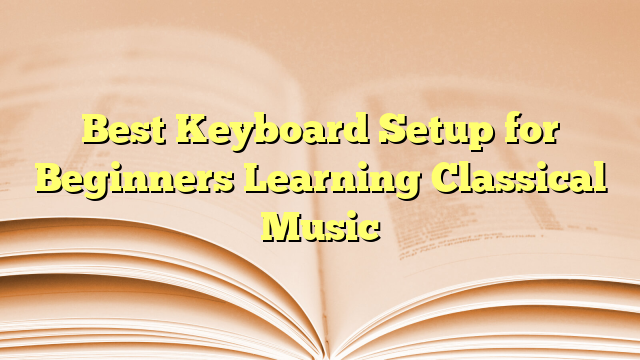Stepping into the world of classical music can be both exhilarating and daunting for beginners. The right keyboard can make all the difference, turning initial attempts into a journey of musical discovery. It's not just about having 88 keys; it's about finding a keyboard that speaks to the heart, encouraging those first tentative steps into Bach, Beethoven, and beyond.
Choosing the perfect keyboard for classical music isn't just about the specs; it's about the feel, the sound, and the inspiration it brings. For beginners, the vast array of options can seem overwhelming. Yet, with a little guidance, finding that perfect match becomes less of a challenge and more of an exciting quest. Let's dive into what makes a keyboard ideal for those starting their classical music adventure.
Understanding the Key Features
When beginners embark on their journey to play classical music, understanding the key features of a keyboard becomes crucial. Keyboards differ greatly in terms of functionality and quality, and for classical music, certain attributes stand out as particularly important.
Firstly, weighted keys are a must. They mimic the resistance and response of a traditional piano, an essential aspect for beginners to build proper finger strength and technique from the start. This feature allows for a more expressive performance, which is vital for the dynamics and emotion in classical music.
Another critical consideration is the sound quality. A keyboard that offers a range of sounds including the grand piano, with nuanced tonal variations, can significantly enhance the learning experience. It’s not just about having a sound that's close to an acoustic piano, but also about the quality of the sound through the speakers. Good sound quality can truly motivate beginners by making practice sessions more enjoyable and rewarding.
The number of keys on the keyboard is also important, with the standard being 88 keys, just like an acoustic piano. This feature allows beginners to explore a wide range of classical pieces without limitation. However, for some, space or budget constraints might make keyboards with fewer keys, like 61 or 76, a practical starting point. It's important to note, though, that as one progresses, having the full range becomes more critical.
Furthermore, the touch sensitivity feature reflects the dynamics in one’s playing depending on how hard or soft the keys are pressed. This capability is crucial for expressing the nuances in classical music. Not all keyboards come with adjustable touch sensitivity, so looking for one that does provide this functionality is beneficial for a more detailed and dynamic learning experience.
Lastly, beginners should consider connectivity options such as USB or MIDI ports, which allow the keyboard to connect to computers and other devices. This can be incredibly useful for using educational apps, recording music, or even updating the keyboard’s firmware.
| Feature | Why It's Important |
|---|---|
| Weighted Keys | Mimics acoustic piano, builds proper technique |
| Sound Quality | Enhances learning, makes practice enjoyable |
| Number of Keys | Allows exploration of a wide range of pieces |
| Touch Sensitivity | Reflects dynamics, crucial for nuance in playing |
| Connectivity Options |
Types of Keyboards for Beginners

When choosing a keyboard for a beginner to play classical music, understanding the different types of keyboards available on the market is crucial. Each type offers unique features and benefits suited to different aspects of learning and playing classical music.
Digital Pianos
Digital pianos are designed to closely mimic the sound and feel of an acoustic piano. They often come with 88 weighted keys, making them an excellent choice for beginners aiming to develop a proper technique and touch. Many digital pianos also feature realistic sound samples of grand pianos, providing beginners with an inspiring sound quality. They're an ideal type for those who have space constraints but don't want to compromise on the acoustic piano experience. Some popular models even include built-in learning tools and exercises tailored for classical music learners.
MIDI Controllers
While not traditional keyboards, MIDI controllers are versatile tools for those interested in exploring classical music composition or arranging alongside playing. MIDI controllers lack built-in sounds; instead, they're designed to trigger virtual instruments on a connected computer or external sound module. This setup offers endless sound possibilities, including authentic classical instrument samples, making it a valuable tool for experimentation and learning. MIDI controllers come in various sizes, but for classical music, those with 88 weighted keys are most beneficial.
Synthesizers
Synthesizers offer a broad range of sounds and capabilities beyond traditional piano tones, including orchestral and choral sounds that can enrich a beginner's experience of classical music. They're equipped with various features like touch sensitivity and, sometimes, weighted keys. Synthesizers encourage beginners to explore sound creation and understand musical textures, proving to be a fun and educational tool. However, for purely classical training, they might not be the primary choice but rather a supplementary instrument for broadening musical knowledge and creativity.
Portable Keyboards
Portable keyboards are lightweight and usually more affordable, making them an attractive option for beginners. Though they typically have fewer keys than an acoustic piano, many models offer 61 to 76 keys with touch sensitivity, which can be sufficient for starters. Portable keyboards have various sounds and built-in rhythms, enabling beginners to practice classical music pieces in different instrumental tones. This variety can make practice sessions more engaging and enjoyable. However, the key experience might differ from digital pianos as they often lack weighted action.
Importance of Touch Sensitivity

When delving into the realms of classical music, the importance of touch sensitivity in keyboards can't be overstated. Touch sensitivity, or the way a keyboard responds to the speed and pressure of a player's fingertips, plays a crucial role in molding a beginner's capability to express emotions through music. It's what allows musicians to convey subtleties in loudness and softness, mirroring the expressive depth found in acoustic pianos.
Without touch sensitivity, every note sounds the same, regardless of how softly or forcefully it's played. This monotony stands in stark contrast to the dynamic richness that classical music demands. Hence, keyboards equipped with good touch sensitivity offer a canvas that's far more reflective of the nuanced expressions found in classical compositions. This feature becomes an instrumental part of a beginner's learning journey, enabling them to explore and develop their musical expressiveness from the outset.
Graded Hammer Action
To further enhance the learning experience, some keyboards mimic the feel of an acoustic piano through Graded Hammer Action. This technology simulates the weighted feeling of hammer strikes on strings, with keys heavier in the lower octaves and lighter in the higher ones. This replication isn't just about authenticity; it's about training finger strength and agility in a way that's consistent with traditional piano playing. This feature ensures that transitioning from a digital medium to an acoustic piano is as seamless as possible, fostering a more comprehensive development in students' playing techniques.
Velocity Layers
Another aspect closely tied to touch sensitivity is the concept of Velocity Layers. High-quality keyboards often come equipped with multiple samples for each key, triggered by different levels of pressure. This means that a soft press might elicit a gentle sound, while a hard press brings forth a more intense tone. The availability of these layers greatly enriches the auditory feedback beginners receive, encouraging a more delicate control over their touch and further aligning their practice with the expressive demands of classical music.
By integrating touch sensitivity, Graded Hammer Action, and velocity layers into their practice, beginners are not only learning to play notes but are also stepping into the complex world of musical expression. This immersion into the sensory and emotional aspects of music from an early stage nurtures a profound connection with the classical genre. It allows learners to appreciate the depth and breadth of musical dynamics, setting a solid foundation for their future growth as musicians.
Selecting the Right Sound Options

When embarking on the journey to master classical music on a keyboard, selecting an instrument with the right sound options is pivotal. For beginners, the plethora of sounds available in digital keyboards can be overwhelming yet exhilarating. The key is to find a balance between quality and variety to foster musical growth while keeping the experience enjoyable.
Most quality keyboards offer a range of sounds that replicate various instruments, essential for playing and understanding classical compositions. However, the focus for beginners should primarily be on finding a keyboard that offers authentic piano sounds. A rich and dynamic piano tone allows learners to immerse themselves fully in the nuances of classical music, making practice sessions more productive and gratifying.
Why Sound Quality Matters
The quality of sound has a profound impact on a learner’s ability to discern and appreciate the subtleties in classical music. Digital keyboards with high-quality samples and adequate polyphony ensure that notes sound true to life and blend seamlessly, mirroring the acoustic experience. Polyphony refers to the number of notes a keyboard can produce at once. A minimum of 64-note polyphony is recommended for beginners, but opting for 128-note polyphony or higher can offer a more future-proof choice.
Exploring Built-in Features
In addition to basic piano sounds, exploring keyboards with built-in features such as reverb and chorus effects can enhance playing experiences significantly. Reverb adds depth, making it sound as though one is playing in a concert hall, while chorus effects can enrich the sound, providing a symphonic feel that is particularly beneficial when playing complex classical pieces.
Here’s a table that summarizes the minimum desired features for beginners interested in classical music:
| Feature | Minimum Recommended |
|---|---|
| Polyphony | 64 notes |
| Key Sensitivity | 3 levels |
| Sound Quality | High-quality samples |
| Additional Features | Reverb, Chorus |
Importance of Experimentation
It’s important for beginners to experiment with different sound settings to find what best suits their style and the piece they are playing. Many keyboards come with the ability to record and playback, which can be incredibly useful. Beginners can listen to their performance and understand how different sound options affect the mood and expression of the music.
Setting Up for Success

When diving into the realms of classical music with a keyboard, the setup is just as critical as the instrument itself. A conducive environment and the right accessories can significantly enhance the learning curve for beginners. They'll need more than just a keyboard to unlock their full potential.
Ergonomics plays a crucial role in learning and practicing classical music. Beginners should invest in a stable stand and an adjustable bench, ensuring they maintain a proper posture. An incorrect posture not only affects performance but can lead to long-term physical strain. The height of the keyboard and bench should allow the player's arms to be parallel to the floor, promoting ease of movement across the keys.
Good lighting is essential. It helps in reading sheet music clearly without straining the eyes. A flexible desk lamp can direct light exactly where it's needed, making practice sessions more efficient and enjoyable.
The type of headphones used can make a big difference. For those living in shared spaces or practicing during odd hours, high-quality headphones that faithfully reproduce sounds are indispensable. They allow for an immersive experience without external distractions, letting beginners focus on the nuances of the pieces they're learning.
Practice Tools and Apps have revolutionized the way beginners learn classical music on keyboards. Metronomes, both standalone and apps, are vital for developing a strong sense of timing and rhythm. In addition, there are numerous apps available for smartphones and tablets that offer interactive lessons and sheet music tailored to all levels. These tools provide valuable feedback, including timing and note accuracy, which are fundamental when playing classical music.
Recording Equipment can be a game-changer. Recording practice sessions doesn't require elaborate setups; even a smartphone can capture playbacks that are crucial for self-review. Listening to one's playing can reveal subtleties and mistakes not noticed in the moment, offering opportunities for self-improvement.
Lastly, integrating Educational Materials into the setup can expedite the learning process. Books and online resources specifically designed for classical music learners offer insights into techniques, music theory, and compositions ideal for beginners. These materials often include practice pieces that progressively increase in difficulty, catering to the learner's growing skills.
Conclusion
Embarking on the journey of learning classical music on a keyboard is an exciting endeavor. With the right setup, from a stable stand and adjustable bench to good lighting and quality headphones, beginners are well on their way to mastering the art. Incorporating tools like metronomes, interactive lessons, and educational materials further enriches the learning experience. Recording one's practice sessions offers invaluable insights for improvement. By following these guidelines, beginners can look forward to a rewarding musical journey filled with growth and enjoyment.
Harlan Kilstein began playing piano during covid with no piano background at all. He taught himself how to play learning what to do and what not to do.
Today he's an advanced intermediate player and can help you grow in your skills because he learned all this on his own.








